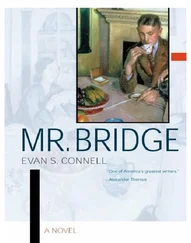they were under the impression he was a lion tamer. After this was straightened out he was put into a movie-The Tattler spoke of “Kansas City’s own Carleton Reynolds/’ which was what Hollywood named him. Surprisingly, or so Mrs. Bridge had thought, the fact that he was a Kansas Citian did not noticeably increase the run of the picture. She had gone to see it. Rugg had appeared in only one scene: on the stroke of midnight, arms bound behind his back and a sack over his head, he fell out of a grandfather clock.
“Of course his part was small/’ she had remarked while discussing it with Madge Arlen, “but I do think he’s quite talented/’
However Hollywood must not have thought so, for Rugg was next heard from selling encyclopedias on the Plaza.
The new Tattler came out a few days after Ruth returned to New York and Mrs. Bridge mailed a clipping to her; “Found holidaying at the charming home of her parents, Mr. and Mrs. Walter Bridge of Crescent Heights Drive, was the lovely eldest, Ruth, now setting Gotham aflame. Scores of admirers hope the fascinating and exotic editoress-to-be won’t become a permanent Manhattanite.” On the back of the clipping was the conclusion of an article of advice to hostesses: “… jungle the natives simply peel and eat, and so should we! No more worry about knives and forks, left-hand or righthand.” And below this was the first line of a quotation from Thoreau.
Mrs. Bridge wrote that Carolyn was playing golf every afternoon and had beaten one of the boys who was on the university team, that the weather in Kansas City was awfully pleasant this time of year, that some man named Genaro had telephoned just after she returned to New York but hadn’t left a message, that the city was finally widening the street in front of the Junior League clubhouse, and that her visit to Kansas City had seemed awfully brief. Ruth had remarked on the graft in New York, so Mrs. Bridge wrote, “Isn’t it awful there’s so much graft? We have it here, too. It just makes you wonder about people.”
She also mentioned what had been going on socially and what events were on the calendar. ”Wednesday evening the Arlens are staging a cocktail party for Anne who’s off to Europe and it sounds quite intriguing. Thursday, Madge and I are off to a recital given by some folk singer who plays the dulcimer, and then on Friday there’s to be a church doing (at which a Moslem will talk!) but I’m not sure I’ll be able to make it. I’ve been having a siege of headaches and they just don’t seem to be able to make heads or tails of them. Dr. Stapp told me it’s all mental but that doesn’t make sense. Dr. Mclntyre (he’s so nice!) thinks it may be an allergy but if so I wish they’d hurry up and get together, whatever it is. Then next Monday there’s a reception at Crestwood for the McKinney girls who’re just back from a month at the Royal Hawaiian. That must have been grand….”
Ruth chose to answer this letter one night while she was in bed with a man named Dowdey, whom she had met the previous week. She wrestled the pillow away from him and put it behind her back in order to sit up more comfortably, and with an airmail pad on her knees she began: “The weather in New York has been lovely, but otherwise there isn’t very much news. I can’t stand my boss because he’s an absolute tyrant, but everybody else is nice, and we’re trying a new format that I like better. A man who works in the next office” and she dropped one hand to give Dowdey a pinch on the buttocks “has been awfully sweet although I don’t know him very well yet. I haven’t been going out much lately, I usually come home after work and get to bed early. It was marvelous seeing everybody in Kansas City.” Here she paused and tapped the pen against her teeth, and finally added that she hoped to visit Kansas City again before long.
Dowdey, having rolled over and raised himself to one elbow, was reading the letter with his chin propped on Ruth’s shoulder.
“Jus’ like I aim to get back to San Antone,” he said, and began kissing her throat.
“Hush/’ she said. “And stop. You’re bothering me!”
“Come on down here and le’s bother all over/’ said Dowdey, “on account of you can write yo’ little mama in the morninY’
“Cut that out/’ said Ruth. “Now cut that out!*’
“Yo* mama look like you?” he asked, sliding his arms around her waist.
“She’s my sister’s mother!”
And as if by hearing these words she realized what she had said, Ruth touched her lover gently and looked down into his unblinking hazel eyes. She caressed the wind wrinkles of his leathery face; he became solemn and expectant.
“I’ll only be a little while/’ she said. For a few minutes she sat with her knees drawn up to her chin and gazed across the river and the buildings on the western shore, and she was able to see her home, not as it was now, but ten years before, at a time in her life when she would never have thought to say her mother was not her own: when she had been as tall as the new evergreen trees in the yard, when her brother was a baby. Now this was gone, and it was gone forever. She wondered why she was in New York, why she would soon give herself to this man for whom she had no feeling.
“I don’t think it’s her fault/’ Ruth whispered, with her head on her knees, and when Dowdey asked what she had said she did not answer. Presently she sighed and continued with the letter, thanking her mother for sending a box of oatmeal cookies Harriet had baked, and said they were wonderful, though in truth they had arrived broken and crushed, and she had sprinkled them on the window sill for the pigeons. Having signed the letter with love, as she always did, she ordered Dowdey to open his mouth and hold out his tongue to lick the envelope.
“That all?” he asked, grinning, as she leaned across him to place the letter on the night table.
“It depends on what you mean,” Ruth said. She turned out the light. When he covered her she was looking across the dark river, gravely thinking of her home.
With Ruth gone and with Carolyn at home only an occasional week end, with Mr. Bridge continuing to spend long hours at the office, and with Douglas appearing only for meals, Mrs. Bridge found the days growing interminable; she could not remember when a day had seemed so long since the infinite hours of childhood, and so she began casting about rueful and disconsolate for some way to occupy the time. There were mornings when she lay in bed wide awake until noon, afraid to get up because there was nothing to do. She knew Harriet would take care of ordering the groceries, Harriet would take care of everything, Harriet somehow was running the house and Mrs. Bridge had the dismal sensation of knowing that she, herself, could leave town for a week and perhaps no one would get overly excited. At breakfast lunch if she chose to call it so she would consider the newspaper with sober apathy, sighing at the events in Europe, lethargically eating whatever Harriet prepared toast and orange juice, chipped beef and cinnamon rolls, fruit salad, bacon and tomato sandwich, a dish of sherbet; whatever it happened to be Mrs. Bridge would eat some of it though it seemed tasteless. Summer had come again, another summer, another year.
One warm windy morning in June she could hardly open her eyes; she lay in the stuffy bedroom and listened to the wind in the trees, to the scratching of the evergreen branches against the house, and wondered if she was about to die. She did not feel ill, but she had no confidence in her life. Why should her heart keep beating? What was there to live for? Then she grew cheerful because she recalled her husband had told her to get the Lincoln waxed and polished. In fact he had told her that three weeks ago but she had not yet gotten around to it. Now, in any event, there was something to do; she would do the work herself. She would drive to the Plaza to an auto-supply store and buy a can of wax and some polish and a chamois, or whatever the salesman recommended, and she would spend the day working on the Lincoln. It had been years since she had done any work, with the exception of puttering in the garden, and it would be refreshing. But then, still in bed, she became doubtful and more reasonable. She had never attempted to polish an automobile, she knew nothing about it, nothing whatso-ever, and if she should ruin the finish of the Lincoln what on earth could she say to her husband? He would be amazed and furious because it was so nonsensical; he would manage to control his temper but he would be infuriated all the same, and want to know why she had done it. Could she explain how the leisure of her life that exquisite idleness he had created by giving her everything was driving her insane?
Читать дальше












